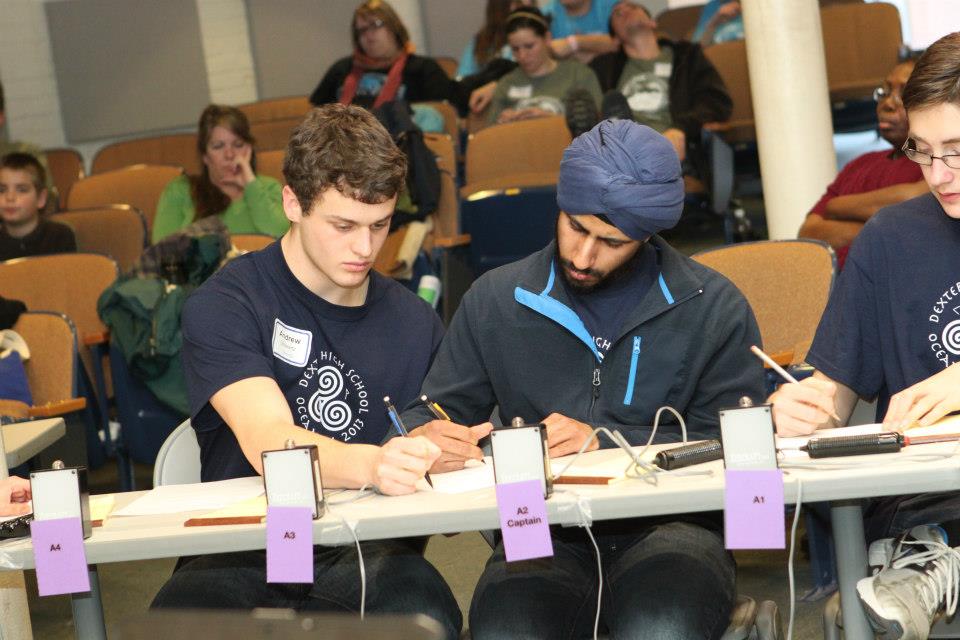
Students rush to finish a challenge question at the Great Lakes Science Bowl held at the University of Michigan. Image: Great Lakes Bowl Staff
By Kayla Smith
With a resume of 10 regional victories, Cheryl Wells knows the secret to building winning Ocean Science Bowl teams: food.
Each study session, the Dexter High School teacher brought goodies for everyone to munch on, building morale and giving that little extra incentive to keep coming back.
“We would eat our ramen or whatever she brought and just read through textbooks, write stuff down, make graphs,” said Graham Norton, a former captain of the Dexter team who is now studying computational math at the University of Chicago.
Wells and her Dexter teams have competed in the Great Lakes Ocean Bowl since it began in 1998. She recently retired, but not before winning one more competition.
Her teams took eight trips to the National Ocean Science Bowl during the past 18 years.
This year the team went to Corpus Christi, Texas, where it placed second in the nation. Students and teacher won a week long adventure, checking out barrier islands, aquariums, the Harte Research Institute for Gulf of Mexico Studies and the Texas A&M marine science water studies program.
“Oh my goodness, what an experience,” Wells said.
The Great Lakes Bowl, sponsored by Michigan Sea Grant, consists of teams of four who compete in a Quiz Bowl-like format. A judge asks questions pulled from a variety of marine science textbooks. Teams buzz in with answers.
Registration for the 2016’s event starts today (Nov. 3) and runs until Dec. 18.
Some questions are easier:
Q: The Great Lakes contain what percentage of Earth’s fresh surface water?
A. 20 percent
And some are hard:
Q: Name two identifying characteristics of monomethylmercuric cation.
A: It is a methyl group bonded to a mercury atom. It is an organometallic cation.
There is a rapid-fire question round and then a couple team challenge questions.
Winners of the event hosted at the University of Michigan go on to the National Ocean Sciences Bowl. The 2016 competition will be held in Morehead, North Carolina, at the University of North Carolina Institute of Marine Sciences.
The top four ranking teams are awarded trips to various coastal cities funded by research institutes, environmental groups or science laboratories across the United States. The trips connect students with the material they’ve studied all year.
This year Wells’ team competed at the Ocean Science Research Center in Mississippi and came in second place in the nation. Not bad for a bunch of kids from the Midwest.
“My kids didn’t grow up with a tide,” and the prospect of going there really motivated them, Wells said.
The Great Lakes Bowl motivates kids to dive deep into marine science trivia. They often find a passion they didn’t know they had.
“It’s really cool to see these students very interested in science,” said Kevin Keeler, the bowl’s outreach coordinator.
“I know a lot of these students go on to do something in the field
Two of Wells’ recent team members have become marine scientists. One is on the Pacific coast researching the use of algae as a bio-fuel.
“[Marine science] was an interest I didn’t even know I had until I learned about it,” Norton said.
Norton got involved when Wells bribed him with a few bonus chemistry points to fill in for a B-team member who had dropped out last minute. The team won the regionals, and Norton stayed on to captain the next year’s team.
“First and foremost, the Ocean Bowl is a great way to make friends. It was the most eclectic and random group of people that I’ve ever been with,” Norton said.
This extra-curricular activity gives students the opportunity to develop their research skills that they may miss out on otherwise, he said.
“We learned by sitting down with a textbook and pulling information out of it, ” Norton said.
The impressive amount of work students put into prepping gives the Great Lakes Bowl a “high-stakes” feel, Wells said.
Norton, competitive by nature, says it’s intense.
The questions are intimidating, especially in the later rounds, said Keeler, who is a fisheries contractor at the U.S. Geological Survey-Great Lakes Science Center in Ann Arbor, Michigan.
“When I get half the questions right I feel really good about myself.”
It’s Keeler’s job to recruit schools. Even if they don’t compete this year, students and teachers should check out the competition, he said. They can see what it’s all about and come back next year.
“People are intimidated,” Wells said. “If people visit the bowl and felt out the lay of the land, anybody can compete. They can make it a club. It’s very doable.”
Sixteen teams from throughout the Great Lakes states are eligible to compete. Schools can register through the National Ocean Sciences Bowl website.
If you’re interested in the sciences, the Great Lakes Bowl is a great volunteer opportunity, Keeler said.
The 2016 Great Lakes Bowl is Feb. 6 at the University of Michigan School of Natural Resources and Environment.
For pictures and information visit the bowl’s Facebook page.
